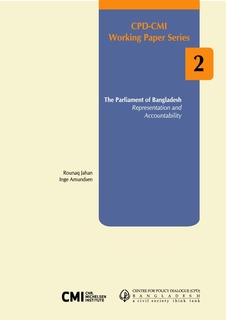The Parliament of Bangladesh: Representation and Accountability
Research report
Permanent lenke
http://hdl.handle.net/11250/2474847Utgivelsesdato
2012-04-10Metadata
Vis full innførselSamlinger
- Publications [1488]
Originalversjon
Dhaka and Bergen: Center for Policy Dialogue (CPD) and Chr. Michelsen Institute (CMI) (CPD-CMI Working Paper series CPD-CMI WP 2012:2) 69 p.Sammendrag
The constitution of Bangladesh bestows the parliament with supreme powers in making laws and approving budgets. It is given wide-ranging authority to scrutinise the actions of the executive who remains accountable to the parliament. Notwithstanding these constitutional powers, in reality, the parliament’s performance has fallen far short of its promise of being the central institution of democracy, expressing the will of the people, and making the government regularly accountable to that will. The major focus of this present study is to investigate the evolution of the role and functions of the parliament since Bangladesh’s independence. Though the parliament performs many roles and functions, we mainly focus on its two key roles: representation and accountability. In this study we have analysed the accountability role of the parliament in both its horizontal and vertical dimensions. To assess horizontal accountability we have assessed the parliament’s performance in legislation and budget making; and, in scrutiny and oversight of the executive branch of the government. To investigate the state of vertical accountability, we have focussed on the issue of the parliament’s accountability to the citizens. Here we have explored the practices being used by the parliamentarians as well as citizens to ensure the former’s accountability to the latter. The study discusses the historical evolution of the nine parliaments in the context of the changes in the political system of the country. In particular, ‘the rules of the game’, the constitutional and legal provisions, have changed over the years. We have also described the structure, institutions and functions of the parliament in Bangladesh as prescribed by the constitution and the Rules of Procedure of the parliament. We have in particular focussed on the parliament’s role of representation and its accountability to the voters and citizens. Representation is st
